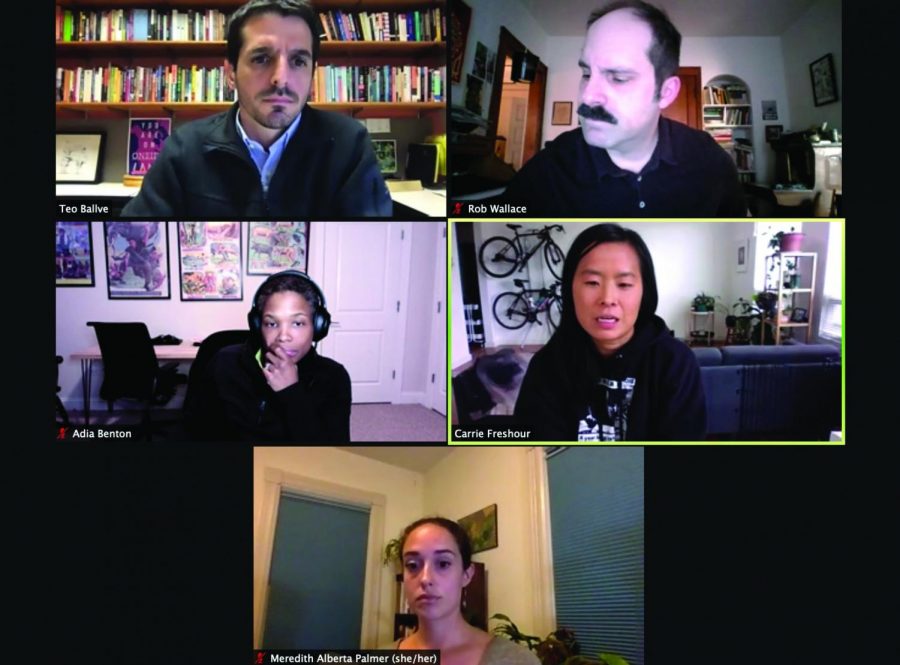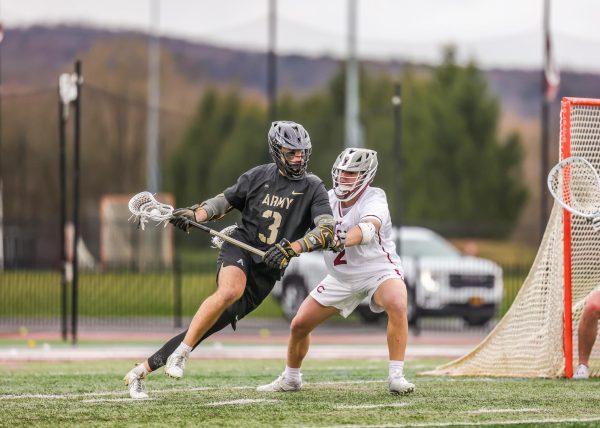21st Century Plagues: The Political, Ecological, and Economic Dimensions of Pandemic Disease
The Geography Department hosted four panelists — Adia Benton, Carrie Freshour, Meredith Palmer and Rob Wallace — to discuss the political, ecological and economic dimensions of pandemics on Wednesday, Oct. 28.
Moderator and Assistant Professor of Peace and Conflict Studies and Geography Teo Ballvé introduced the Zoom webinar, titled “21st Century Plagues: The Political, Ecological, and Economic Dimensions of Pandemic Disease.” Ballvé argued that there is no such thing as a natural disaster because “natural” implies inevitability. He instead suggested that there is nothing natural about vulnerability.
“Cutting into the forest and destroying [habitats] to make way for plantations, whether it is banana, oil palm, rubber, increases the likelihood of a virus spilling over to humans from their natural habitat. So, making us think more critically about where our food comes from and its relationship to diseases like COVID-19 is the main takeaway [of this discussion],” Ballvé said.
Wallace, a member of the Agroecology and Rural Economics Corps and author of Dead Epidemiologists: On the Origins of COVID-19 shared his research on the link between the agro-industrial food system and disease outbreaks.
“The way we farm is starting to shift; small scale farming is not as lucrative or sustainable in our current economy. To meet demand, farmers must increase their supply,” Wallace said. “The natural economy and natural farming is now moving towards 15,000 turkeys stuffed into one area. There is a direct line between capitalism, agriculture, and the deathly pathogens we now face.”
To further explain this concept, Wallace provided the example of Ebola and oil palm cultivation in West Africa. In West Africa, palm oil cultivation created mass deforestation. As a result, many animals died along with the pathogens they carried. However, other animals like bats gravitated toward the palm oil plantations. With no predators, the bats thrived and spread their deadly pathogens to the humans tending to the plantations, ultimately increasing the transmission of Ebola. Wallace has coined this process of exploitation “neoliberal Ebola.”
“Neoliberal Ebola [is] a cutting edge version of capitalism [in which] areas are unnaturally exploited for resources,” Wallce said. “Soon enough [Ebola] had infected thousands, killing many, and leaving bodies in the streets of capitals.”
Freshour is a graduate of the University of Washington and is the author of Cheap Meat, Cheap Work in the US Poultry Industry: Race, Gender, Immigration. Her research focused on the ways in which premature death and illness is linked to societal structures of racism.
“At every stage of the pandemic [there are] social dimensions [that are] affected by class, race, gender, and any number of other social identities. It is not surprising that Native American communities, LatinX communities, and African American communities are the most affected by this disease. Why? Because they are the ones who face disproportionate rates of diseases, predisposed health conditions, most exposed to pollutants, and oftentimes work the essential jobs we rely on. In all these different ways, the most vulnerable communities are people from [racial and ethnic minority groups],” Ballvé said.
According to Palmer, author of Land, Family, Body: Measurement and the Racial Politics of U.S Colonialism in Haudenosaunee Country, native communities have been hit the hardest by COVID-19.
“Navajo groups had higher rates [of infection] than New York and New Jersey,” Palmer said.
There are over 500 tribes in the U.S and those are only the ones that are federally recognized, Palmer explained. Most of these communities are rural and rely on Indian Health Service (IHS), an agency within the Department of Health and Human Services that is responsible for providing federal health services to its patients. According to Palmer, the agency is underfunded, resulting in drastic effects for native communities during COVID-19.
“Some communities have been losing a tribal member a day. Sometimes there are only three elders left who speak an entire language. What happens when you lose these people?” Palmer said.
Benton, author of HIV Exceptionalism: Development through Disease in Sierra Leone, expressed hope that similar trends of activism will cross over in the ways people organize and argue for political change to build healthy infrastructures. She noted a surge in voting and activism surrounding the 2020 election.
“People now are talking about voting in different ways than they did before,” Benton said.
For Freshour, COVID-19 serves as an opportunity to recognize the ways in which society depends on marginalized people and marginalized land to produce food. She emphasized the importance of increasing awareness about essential workers and essential work.
“[The pandemic] is an opportunity to shift how we value people and places,” Freshour said. “With an intersection between COVID-19 and Black Lives Matter, there is a convergence in how people are thinking about the future and questions about volition.”
Ballvé expressed similar sentiments.
“It really depends on how this moment is harnessed [by political forces],” Ballve said. “My hope is that, [with] the pandemic, Black Lives Matter and everything else going on in [the] United States, politics right now will move stuff in a more positive direction.”







